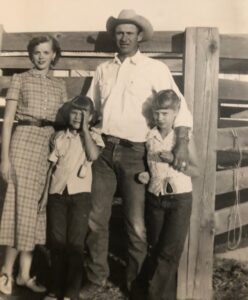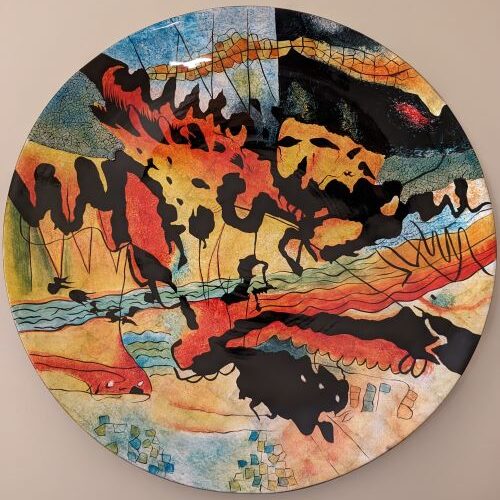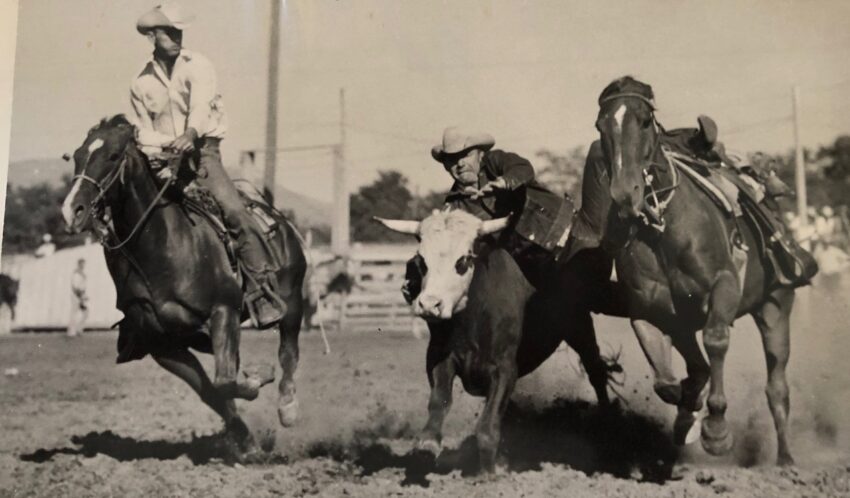I grew up with cowboys, the real thing. My daddy was a professional rodeo cowboy — a calf roper and a bulldogger. He was born at home on a little ranch in west Texas. The Coffeys were ranchers and horsemen. All my daddy ever wanted to do was to rodeo. From the time I was born until I was about twelve, we started in May of each year and traveled from rodeo to rodeo throughout the western part of the United States. Our family consisted of my daddy, my mother, and my little sister, Susie. Each spring no matter where we were living at the time, Daddy would be reading the Rodeo Sports News and mapping out our summer, looking at dates of the good rodeos: where they were, how much entry fees were required, and the payouts to the winners.
When it was time to head out, we would put the old green metal suitcase on the floor behind the driver, a hand-tooled leather duffle that Daddy had won at a rodeo somewhere, and behind the passenger side, pile folded blankets and pillows to make a big bed over the entire backseat for me and Susie. We were to spend hours back there with our dolls and story books as we headed down numerous highways from rodeo to rodeo. After readying the inside of the car, we hitched up the horse trailer, loaded up the horses, threw some hay and grain under the manger, and headed out. We usually left school a few weeks early to get to the first rodeo.
Rodeoing in those days was a family affair. We would see the same families over and over at the various rodeos. Cowboys are a close-knit bunch. They helped each other out many times sharing meals, helping with kids, transporting a horse to the next rodeo, and even sometimes loaning the entry fees so someone could enter an event hoping to win enough to repay. Many of these families, like ours, lived from rodeo to rodeo with just the winnings to support them. It was “feast or famine.” I remember years later after Daddy had retired from rodeoing, an old friend of his came by our house looking for Daddy. He said he wanted to repay Edd that $125.00 he had loaned him for his entry fees years ago. There was honor among cowboys in those days.
There were two distinct groups of rodeo cowboys — the calf ropers, bulldoggers, and team ropers; and then the bronc riders and bull riders. The first group had to have trained horses which they had to transport from rodeo to rodeo, and the second group had only to carry their saddle and rigging.
As I look back over those years I just remember being on a big adventure. I recall pulling into the rodeo grounds at Angel’s Camp, California, late one night after a long day. We unloaded the horses, found an empty stall, threw in a few chips of hay and made sure they had plenty of water. We were all tired, out of money, and Daddy was up in the calf roping the following afternoon. We pulled over to the side of the barns and Mama crawled in the backseat bed with me and Susie, while Daddy tried to stretch out in the front seat. Early the next morning someone knocked on our car windows. Daddy wiped the condensation off the windows to reveal a good friend peering in. He said they were cooking up a bunch of eggs and bacon in their little trailer and to come join them. Luckily Daddy won the “day money” in the calf roping that afternoon and we were good to go on to the next gig.
At the larger rodeos, sometimes there were too many contestants in an event to allow all of them to compete during the actual performance. It would make the length of the rodeo too long to hold an audience until all had participated. To run all participants through once in a particular event was called a “go-round.” If it was a three-day rodeo, there would be the first go-round, second go-round, and third go-round. The best time in each go-round won the “day money.” The best time averaged from all three go-rounds won the “average.” That was a big deal. If a contestant was not lucky enough to participate during the performance, they were up in the “slack.” The slack was done after the grandstands were empty but the times were still part of that go-round. Sometimes Daddy would be in the slack and afterwards we would load the horses and head out to the next rodeo driving through the night to arrive in time for the performance. Of course, Susie and I could sleep comfortably mile after mile in our little bed in the back seat!
One year when I was about five or six and my sister, three or four, we had a red Ford pickup and a little Airstream house trailer. Daddy built an enclosure for his horses in the bed of the pickup. He then took out the back window and created a little bed under the horses’ manger above. Susie and I would get in there and play or sleep sometimes taking turns riding in the front seat. I remember one particular night looking out of our little box at the headlights going down the road mile after mile with the radio station from Del Rio, Texas, playing Hank Williams, Fibber McGee and Molly, and The Shadow. We began to feel little hay dust seeping from the cracks of the manger overhead. We were itching all over. We begged Daddy to fix it. He finally pulled over in the dark, grabbed a roll of toilet paper, and while Mama held the flashlight, he laid out on his back through the little opening and used his pocketknife to stuff toilet paper in the cracks. After shaking out all the bedding, we climbed back in and continued on our way.
Eating on these numerous road trips was always a big event. Daddy was always “hell bent on leather” to get to the next destination and hesitant to stop very much. We would start saying we were hungry and he would put us off by saying he knew of a little truck stop on the other side of town. Of course, there would be none but he assured us that it must be the next town.
Eventually we would stop. Our favorite things were Corn Flakes with half ‘n half, and nothing compared to a hot roast beef sandwich! Sometimes Mama would run into Safeway and grab a loaf of bread, a quart of milk, a little jar of mustard and a package of bologna. We would continue down the road as she made us all sandwiches and passed the quart of milk around. When you are bored and hungry, nothing tastes better!
Eventually the rodeo season would come to an end. There weren’t the big indoor arenas that you see today, so performances depended on good weather. Usually the last big rodeo for the season was in Pendleton, Oregon. It ran over two weekends. There were big teepees all around the rodeo grounds and all of us kids loved to run around their camps exploring. Before we knew it, it was time to head for home. Usually that meant New Mexico where Daddy always found work in construction, we would enroll in school, usually a few weeks late, and settle down until spring when we started all over again.

Copyright © 2024 by Carol Carryer


Carol, what a captivating story! The details of living a cowboy life and memories you shared as a family are vivid and heartwarming. Great read.